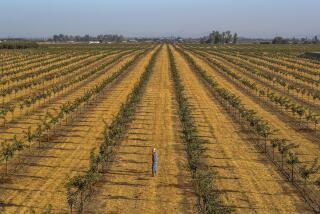Governor Hopes to Harvest Farm Support in Key States
SACRAMENTO — If the farm vote was not important, presidential candidates would not dress in blue jeans and cowboy boots, walk through ankle-deep stockyards and speak from stages made out of hay bales.
But agriculture is a major constituency in several key states along the presidential campaign trail--notably Iowa, host of the nation’s first presidential showdown. As farmers nationwide begin to size up California Gov. Pete Wilson’s White House credentials, his campaign will stress that he comes from America’s biggest agricultural bastion.
That will probably not be enough, however. Political strategists say Wilson’s presidential campaign will be graded more on his answers to new questions than on his past performance. That’s because Iowa farmers have a greater concern about federal price supports and hog bellies than about the water and Medfly problems suffered by their California counterparts.
“You can’t go in there and say, ‘I come from the biggest ag state’ and leave it at that,” said John Sears, a GOP strategist for President Ronald Reagan in 1980. “If you go in there with that attitude, you will have problems.”
Wilson’s campaign is trying to determine whether it should seriously campaign in Iowa, where Senate Majority Leader Robert Dole, the consensus front-runner in the GOP presidential race, is a strong favorite. Even if Wilson bypasses Iowa, several other key states have influential farm communities.
Wilson’s campaign is barely off the ground, but it has already demonstrated how seriously it considers agriculture. About half a dozen Republican activists who helped President George Bush’s 1992 campaign reach out to farmers met with the governor recently in Washington to prepare the same effort for Wilson.
The governor’s latest appointment to head the state Department of Food and Agriculture, Ann Veneman, also is perceived as a decision intended for a national farming audience. Veneman won popular support in America’s heartland by serving as the Bush Administration’s chief trade negotiator trying to open new international markets for U.S. food exports.
“I hope that she’s going to spend every weekend and every vacation day she has out giving speeches around the country for Pete Wilson,” said Richard Douglas, a food company executive who will head the Wilson campaign’s attempt to reach farmers.
National political strategists say it is hard to determine how important the farm vote will be in the presidential race. If all of the major candidates adopt similar positions on agriculture, then farmers, like other voters, probably will make their choice based on other concerns.
“In the past, they all pretty much were singing from the same page,” said Brian Kennedy, chairman of the Iowa Republican Party.
But Kennedy and others said things might be different this year as candidates focus on ways to cut the federal deficit and, increasingly, lawmakers are targeting farm subsidies. Richard G. Lugar, a presidential hopeful and Indiana senator, already has triggered the debate among White House hopefuls by supporting the reduction in agriculture spending.
Wilson has not yet taken a position on farm subsidies, but he has offered himself as a presidential candidate who will make difficult decisions to cut federal spending. Subsidies have not been a major issue in California. Unlike in Iowa, where as much as 90% of the harvest receives federal price supports, farm officials said less than a quarter of the crops in California are eligible.
A number of other California crops, including citrus and such specialty crops as dried fruits and nuts, receive other forms of federal assistance.
Instead of price supports, Douglas said trade will be the agricultural issue that Wilson’s campaign will emphasize.
“The common thread that runs through the agriculture community--be it California, Texas, Kansas, Iowa, Illinois, Pennsylvania or New York--is international trade,” he said. “One out of every three acres we plant in America is destined for the export market. . . . So I think, from time to time, you will hear Wilson talk about his ‘golden rule’ of trade--you let my goods in and I’ll let your goods in.”
In California, Wilson’s record on farm issues reflects his diligent attention to a group that has been one of the most important factors in his political career and that contributed more than $2 million to his gubernatorial campaigns since 1989.
Farm groups have strongly backed Wilson in all four of his statewide victories--two for U.S. Senate and two for governor. And in close races, political analysts say, the support of farmers has been pivotal.
Wilson sided against the cities and for the farmers when he acted as a strong proponent of Medfly spraying. And today, on the latest issue raging in the state’s farm country, Wilson has become an outspoken critic of the costs farmers pay to comply with the Endangered Species Act.
Still, there is a widespread consensus among California farmers that Wilson should not run for President. Many say they feel betrayed that he would abandon the office that they helped him win in Sacramento and that he would risk losing it to an unfriendly Democrat.
Despite their disappointment, many farmers said they expect California’s agricultural community to grudgingly support Wilson’s presidential ambitions because of an appreciation for his help in the past.
More to Read
Get the L.A. Times Politics newsletter
Deeply reported insights into legislation, politics and policy from Sacramento, Washington and beyond. In your inbox three times per week.
You may occasionally receive promotional content from the Los Angeles Times.










